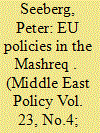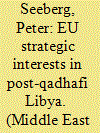|
|
|
Sort Order |
|
|
|
Items / Page
|
|
|
|
|
|
|
| Srl | Item |
| 1 |
ID:
172017


|
|
|
|
|
| Summary/Abstract |
There is no doubt that the EU has significant potential when it comes to soft power. As mentioned in the EUGS, the EU is the primary trading partner and foreign investor for most countries around the globe. The EU member states together invest more in development cooperation than the rest of the world combined: promoting job opportunities, inclusive societies, human rights, peace building and the resilience of states and societies. These elements of EU policies sum up the traditional understanding of the union as a soft power, and to some extent also its self‐perception. However, as indicated by Mogherini, in recent years this self‐perception has been undergoing changes.
|
|
|
|
|
|
|
|
|
|
|
|
|
|
|
|
| 2 |
ID:
149122


|
|
|
|
|
| Summary/Abstract |
The launching of the review of the European Neighborhood Policy (ENP) took place only a few days after the terror attacks in Paris on November 13, 2015. In her press release, the EU High Representative Federica Mogherini added that “the new ENP will take stabilization as its main political priority.”2 Furthermore, it was said that “differentiation and greater mutual ownership will be the hallmark of the new ENP.”3 This article discusses to what degree the EU's foreign and security policies towards the regimes in the Mashreq are capable of contributing to the stabilization of this highly differentiated Middle Eastern subregion. The article analyzes how important foreign- and security-policy dimensions emphasized in the ENP review are dealt with in the context of the Arab regimes in the Mashreq: Egypt, Jordan, Lebanon, Palestine and Syria.
|
|
|
|
|
|
|
|
|
|
|
|
|
|
|
|
| 3 |
ID:
130939


|
|
|
|
|
| Publication |
2014.
|
| Summary/Abstract |
Since the fall of Muammar Qadhafi in 2011, a legitimate monopoly over the means of violence has not been in the hands of the Libyan state. The military confrontation between the regime and what the international media called the "rebels," supported by the NATO no-fly zone, ended in October 2011. However, in 2012 and especially in 2013, Libya witnessed an escalating conflict pitting the democratically elected government and the Libyan state against armed groups and militias. For the EU, this is a challenge to its strategic interests, primarily security in the Mediterranean and secondarily migration and the development of Libya.
|
|
|
|
|
|
|
|
|
|
|
|
|
|
|
|
| 4 |
ID:
181012


|
|
|
|
|
| Summary/Abstract |
The article analyses to what extent the Libyan diaspora was able to influence political processes in Libya under Muammar Qadhafi during the revolution in 2011 and after the fall of the regime. It is shown that the Libyan diaspora played a limited role when the Jamahiriyya, a repressive system of congresses and committees invented by Qadhafi, controlled the Libyan state. The regime drove most of the opposition out of the country, and from abroad a weak Libyan diaspora attempted to influence the development in Libya. The revolution in 2011 resulted in a different reality, where it was possible for the Libyan diaspora to return and play a significant role in the political transformation. However, the situation never stabilized, and a deteriorating security situation led to the creation of a renewed diaspora, which lost influence in Libya. UN-initiated attempts at reconstructing a Libyan polity created a process from which the Libyan diaspora seemed to be alienated. Taking its analytical starting point in the notion of political transnationalism, the article argues that the exceptional character of the Jamahiriyya contributed to marginalizing the diaspora during the Qadhafi regime and in the course of the Libyan transformation after the revolution.
|
|
|
|
|
|
|
|
|
|
|
|
|
|
|
|
|
|
|
|
|